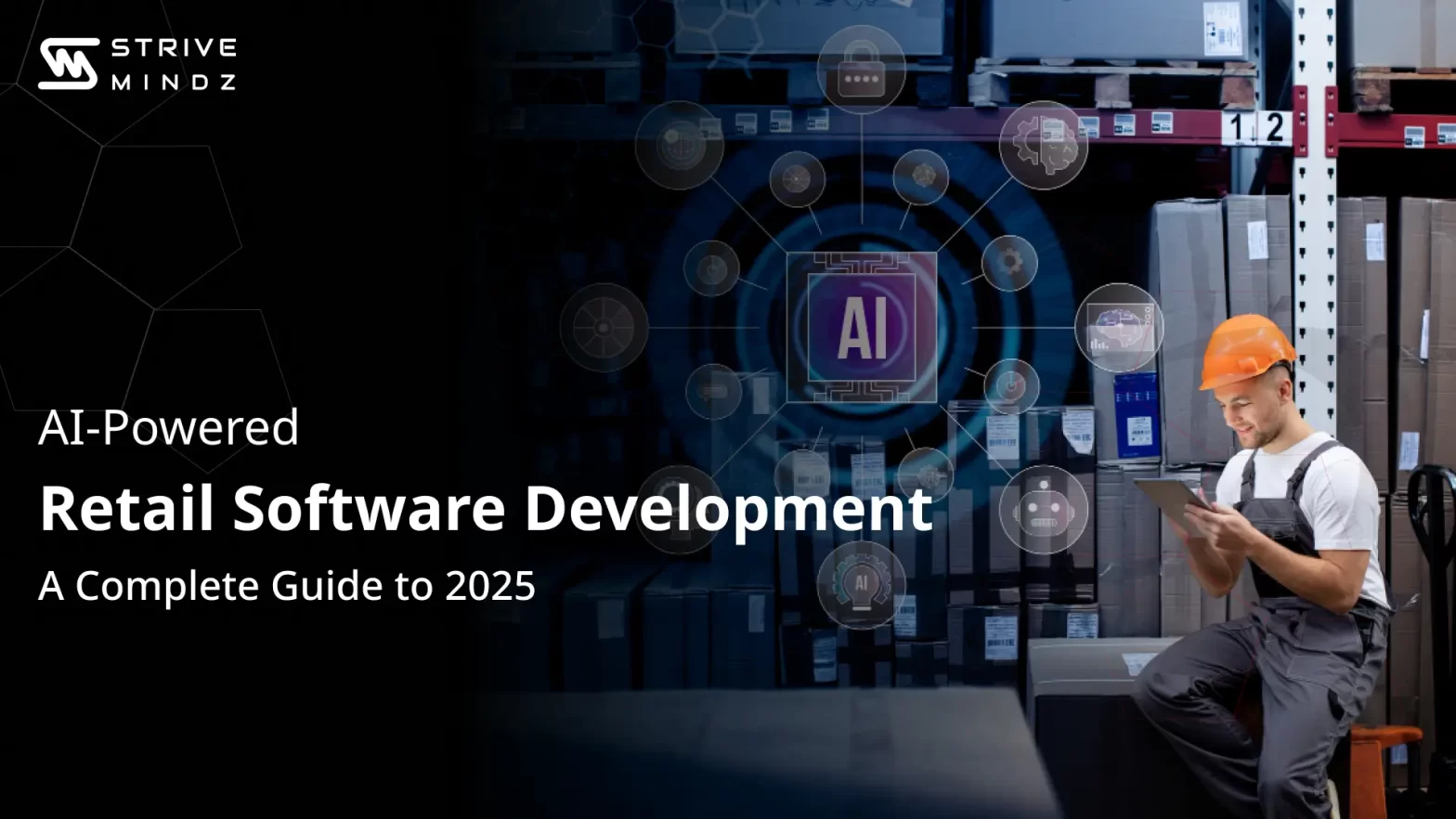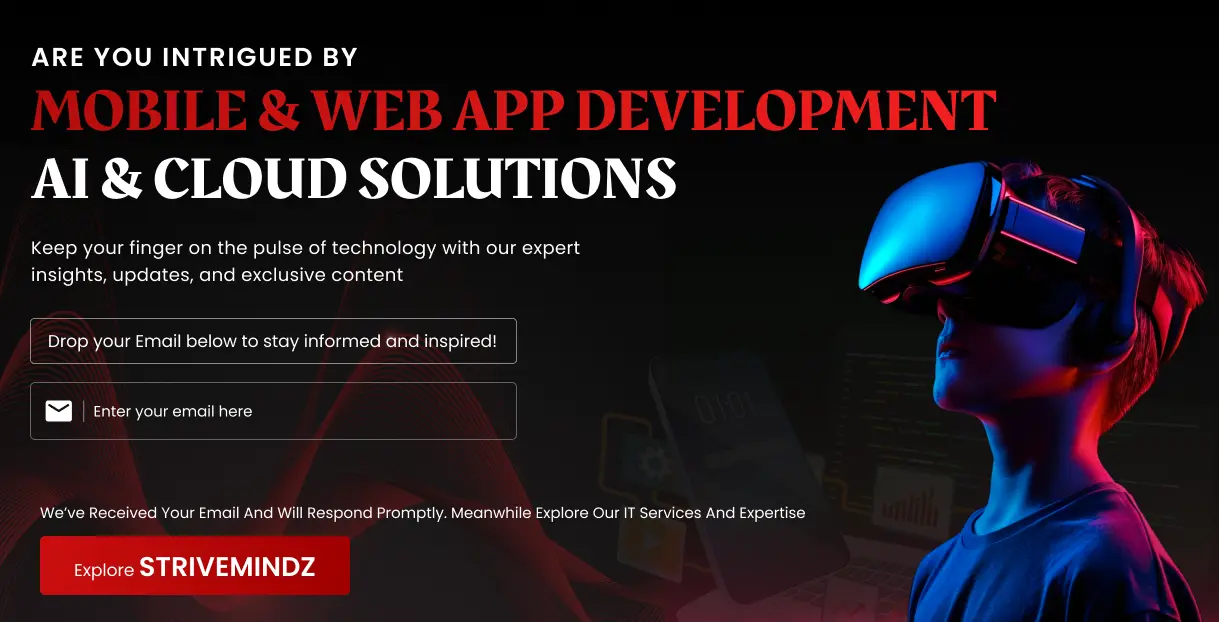AI-Powered Retail Software Development – A Complete Guide to 2025

Most of the latest developments in the technology domain have been influenced by the growth of artificial intelligence (AI). Even in the retail industry, AI has pioneered innovation, improving customer experiences, streamlining operations, and driving sales and revenue generation. As we approach 2025, it has become crucial for retail business owners to have a clear understanding of what AI-powered retail software development is and how they can take the maximum benefits out of it.
Like every other sector, the retail industry has witnessed significant developments with the integration of AI-powered tools and technologies. From personalized shopping experiences to efficient inventory management, AI-powered retail software has revolutionized how businesses operate and engage with their customers. So, what exactly is AI-powered retail software development?
We’ll find out in this guide. We’ll also find out about market insights, key features, business models, technological requirements, challenges, development costs, and prospects of AI-powered retail software development.
What Is AI-Powered Retail Software Development?
AI-powered retail software refers to applications and platforms that utilize artificial intelligence to enhance various aspects of retail operations. These systems use machine learning, natural language processing, and data analytics to automate processes, gain insights, and deliver personalized customer experiences. Take chatbots for customer service, recommendation engines, demand forecasting tools, and automated inventory management systems for example. All such systems use artificial intelligence for the best performance.
Market Insights of AI-Powered Retail Software Development
The adoption of AI in retail is growing by the day. A recent report indicates that the global AI in the retail market is projected to reach $53.74 billion by 2030, growing at a compound annual growth rate (CAGR) of 32.68% from 2025 to 2030. Major retailers are making substantial investments in AI; for instance, Amazon plans to invest $100 billion in AI initiatives in 2025, with a significant portion allocated to Amazon Web Services (AWS) for data infrastructure.
This surge in investment shows that AI will play a critical in shaping the future of retail software.
Furthermore, it’s projected that by 2025, 85% of customer interactions in retail will be managed by AI, highlighting the technology’s growing influence on customer service. Retailers are also recognizing the competitive advantages offered by AI, with 72% believing that AI can provide an edge in pricing and promotions. These trends indicate a significant shift towards AI-driven strategies in the retail sector.
Key Features of Retail Software Development
Personalized Customer Experiences
AI analyzes customer data to offer tailored product recommendations, enhancing satisfaction and loyalty. AI-driven personalized recommendations have been shown to lead to a 50% increase in conversion rates.
Inventory Management
AI systems predict demand trends, optimize stock levels, and reduce holding costs by analyzing sales data and market trends. Implementing AI can reduce forecasting errors by 30-50%, leading to better inventory optimization.
Chatbots and Virtual Assistants
AI-driven chatbots handle customer inquiries, provide product information, and assist in purchasing decisions, improving service efficiency. Chatbots can handle 80% of customer inquiries, significantly enhancing customer service efficiency.
Dynamic Pricing
AI algorithms adjust product prices in real time based on factors like demand, competition, and market conditions to maximize revenue. AI-driven pricing optimization can lead to a 2-5% increase in profit margins.
Fraud Detection
AI monitors transactions to identify and prevent fraudulent activities, ensuring secure shopping environments. Approximately 45% of retailers are implementing AI to enhance fraud detection and prevention.
Business Model of AI-Powered Retail Software
AI-powered retail software operates on different business models –
- Subscription-Based: Retailers pay recurring fees for access to AI tools and services.
- Pay-Per-Use: Charges are based on the extent of AI service utilization.
- Licensing Model: Retailers purchase licenses for AI software, often with ongoing maintenance fees.
- Freemium Model: Basic AI features are offered for free, with advanced functionalities available through paid plans.
The choice of business model depends on factors like retailer size, budget, and specific needs. For instance, a small retailer might opt for a freemium model to access basic AI features without significant upfront costs. On the other hand, a larger enterprise may prefer a subscription-based model to utilize comprehensive AI tools across multiple departments.
Read Also : AI in eCommerce: Evolution, Benefits, and Applications
Tech Stack Required for AI-Powered Retail Software Development
If you’re trying to develop AI-powered retail software, you’re going to need a strong tech stack. Check out the list given below to understand the major technologies that you’re going to need for AI-powered retail software development.
- Programming Languages: Python and Rare are popular for AI development due to their extensive libraries and community support.
- Machine Learning Frameworks: TensorFlow, PyTorch, and sci-kit-learn facilitate the creation and training of AI models.
- Data Management: Robust databases like SQL and NoSQL systems handle large volumes of structured and unstructured data.
- Cloud Services: Platforms like AWS, Google Cloud, and Microsoft Azure offer scalable computing resources and AI services.
- APIs: Application Programming Interfaces enable integration with existing systems and third-party services.
A well-structured tech stack ensures the software is scalable, efficient, and capable of handling complex tasks. Utilizing cloud services, for example, allows for scalable data storage and processing power, essential for handling large datasets in retail operations.
Challenges of AI-Powered Retail Software Development
AI-powered retail software development has a positive future, but it doesn’t mean that there aren’t some challenges that developers might face.
Data Privacy and Security
AI in retail relies heavily on customer data, including purchase history, browsing behaviour, and personal preferences. However, managing and securing this vast amount of data is a major challenge. Retailers must comply with regulations such as GDPR (General Data Protection Regulation) in Europe and CCPA (California Consumer Privacy Act) in the U.S. Any data breaches can severely damage a brand’s reputation and lead to legal consequences.
- Example: In 2023, a major retail company suffered a cyberattack that exposed the personal data of over 100 million customers, causing a significant loss of trust and financial damage.
Integration with Legacy Systems
Many established retailers still operate on outdated legacy systems. Integrating modern AI solutions into these old systems can be time-consuming and expensive. Retailers often face compatibility issues, requiring extensive system upgrades before AI can be fully implemented. Adopting cloud-based AI solutions can help mitigate this issue by providing scalable, easy-to-integrate options without replacing entire systems.
High Implementation Costs
AI software development is expensive, requiring investments in –
- Data collection and processing infrastructure
- AI model training and optimization
- Hiring skilled AI engineers and data scientists
- Cloud computing services and maintenance
For small and medium-sized retailers, these costs can be a significant barrier.
AI Bias and Ethical Standards
AI models learn from data, and if the data is biased, the AI can make unfair or inaccurate decisions. For instance, biased recommendation engines may only promote certain products, leading to customer dissatisfaction. To prevent this, companies should focus on training AI models with diverse, unbiased data. They should also regularly audit AI decisions for fairness.
Customer Adoption and Trust
Not all customers are comfortable with AI-powered retail interactions. Some may find chatbot responses frustrating, while others may have privacy concerns regarding AI-driven personalization. Retailers must educate customers on AI benefits and ensure AI enhances, rather than replaces, human interactions.
Cost of AI-Powered Retail Software Development
The cost of developing AI-powered retail software varies depending on complexity, features, and development resources. Here’s a general breakdown –
Development Costs
| Feature | Estimated Cost |
| Basic AI Chatbot | $5000 – $15000 |
| AI Recommendation Engine | $20000 – $50000 |
| AI Inventory Management | $30000 – $100000 |
| Fully Integrated AI-Powered Retail Platform | $100000 – $500000+ |
On-Going Costs
Beyond development costs, businesses should also prepare for certain ongoing costs, such as –
- AI model updates and maintenance: $5,000 – $20,000/year
- Cloud computing and data storage: $10,000 – $50,000/year depending on scale
- Cybersecurity measures: $5,000 – $30,000/year
Cost Saving Strategies
Businesses can adopt different strategies to keep the expenses within their reach. Examples include –
- Using pre-built AI solutions: Instead of custom development, retailers can use AI tools from AWS, Google Cloud, or IBM Watson.
- Starting with MVP (Minimum Viable Product): Build a simple version first and expand later based on results.
- Using open-source AI frameworks: TensorFlow and PyTorch reduce software development costs.
Conclusion
AI-powered retail software is not just a trend – it’s the future of the industry. By using AI, retailers can –
- Enhance customer experiences through personalized recommendations and AI chatbots.
- Optimize operations with smart inventory management and automated pricing.
- Boost sales and profitability through AI-driven insights and marketing automation.
Despite challenges such as integration, cost, and ethical concerns, businesses that invest in AI will gain a significant competitive edge. By the end of 2025, AI in retail will be an industry standard, and companies that fail to adopt it risk falling behind.
If you’re in the retail industry, we suggest that it’s high time you invest in AI-powered retail software development. Using the latest technology is imperative if you want to taste success in the tight markets. If you want to remain in the competition, AI-powered retail software will be a lifesaver for your business. So contact an efficient software development company today and take the first step towards the future with your retained business!

